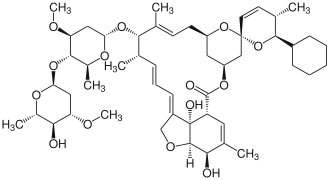Doramectin
Doramectin is a veterinary medicine belonging to the class of antiparasitic agents known as avermectins. It is used primarily in the treatment and control of internal and external parasites in a variety of animal species, most notably in cattle and swine. Doramectin works by interfering with the nervous system of parasites, leading to their paralysis and death. This medication is effective against a broad range of parasites, including gastrointestinal nematodes, lungworms, and certain external parasites like mites and lice.
Mechanism of Action
Doramectin acts by binding to glutamate-gated chloride ion channels which are present in the nerve and muscle cells of invertebrate parasites. This binding increases the permeability of the cell membrane to chloride ions, resulting in hyperpolarization of the nerve or muscle cell, leading to paralysis and death of the parasite. Its mechanism is similar to that of other avermectins, such as ivermectin, but doramectin is often preferred for its prolonged activity and efficacy against certain parasites.
Usage
In veterinary medicine, doramectin is administered to animals through injections, pour-on formulations, or other means designed for specific species and conditions. The choice of administration method depends on the type of animal, the specific parasites being targeted, and the practical considerations of treatment. It is crucial to follow the recommended dosages and administration guidelines to minimize the risk of resistance development among parasites.
Safety and Efficacy
Doramectin is generally considered safe when used according to the prescribed guidelines. However, as with all medications, there can be side effects, and it is important to monitor animals for any adverse reactions following treatment. The safety profile in different species, withdrawal times for meat and milk, and other considerations are well-documented to ensure the responsible use of doramectin in food-producing animals.
Resistance
As with other antiparasitic drugs, there is a concern about the development of resistance among parasite populations. This can reduce the effectiveness of doramectin over time. Strategies to mitigate resistance include rotating between different classes of antiparasitics, using combination therapies, and implementing integrated parasite management practices.
Regulation and Approval
The use of doramectin in animals is regulated by veterinary authorities in various countries. These regulations ensure that the drug is used responsibly, with consideration for animal welfare, food safety, and environmental impact. Approval processes evaluate the safety and efficacy of doramectin for specific uses, and guidelines are provided for its application in the treatment and control of parasites.
Transform your life with W8MD's budget GLP-1 injections from $125.
W8MD offers a medical weight loss program to lose weight in Philadelphia. Our physician-supervised medical weight loss provides:
- Most insurances accepted or discounted self-pay rates. We will obtain insurance prior authorizations if needed.
- Generic GLP1 weight loss injections from $125 for the starting dose.
- Also offer prescription weight loss medications including Phentermine, Qsymia, Diethylpropion, Contrave etc.
NYC weight loss doctor appointments
Start your NYC weight loss journey today at our NYC medical weight loss and Philadelphia medical weight loss clinics.
- Call 718-946-5500 to lose weight in NYC or for medical weight loss in Philadelphia 215-676-2334.
- Tags:NYC medical weight loss, Philadelphia lose weight Zepbound NYC, Budget GLP1 weight loss injections, Wegovy Philadelphia, Wegovy NYC, Philadelphia medical weight loss, Brookly weight loss and Wegovy NYC
|
WikiMD's Wellness Encyclopedia |
| Let Food Be Thy Medicine Medicine Thy Food - Hippocrates |
Medical Disclaimer: WikiMD is not a substitute for professional medical advice. The information on WikiMD is provided as an information resource only, may be incorrect, outdated or misleading, and is not to be used or relied on for any diagnostic or treatment purposes. Please consult your health care provider before making any healthcare decisions or for guidance about a specific medical condition. WikiMD expressly disclaims responsibility, and shall have no liability, for any damages, loss, injury, or liability whatsoever suffered as a result of your reliance on the information contained in this site. By visiting this site you agree to the foregoing terms and conditions, which may from time to time be changed or supplemented by WikiMD. If you do not agree to the foregoing terms and conditions, you should not enter or use this site. See full disclaimer.
Credits:Most images are courtesy of Wikimedia commons, and templates, categories Wikipedia, licensed under CC BY SA or similar.
Contributors: Prab R. Tumpati, MD

